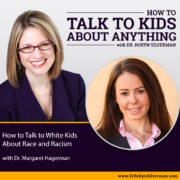How to Talk to White Kids about Race & Racism with Dr. Margaret Hagerman
This podcast will focus on how white kids are being educated about race and racism in America. While we know from research that black families teach their children about social inequalities, race and racism from an early age, what are white families doing? Are families and communities a place where white kids learn to become racist or a space where they learn to be antiracist or race-conscious? Do white kids learn, within the family paradigm, to challenge racial inequalities? Dr. Margaret Hagerman talks about her research and her new book: White kids: Growing Up With Privilege in a Racially Divided America. It’s an important topic that many people avoid out of discomfort or confusion with regard to how to discuss it. We get right into it on How to Talk to Kids about Anything.

